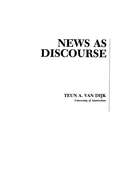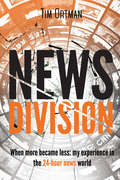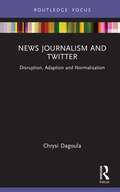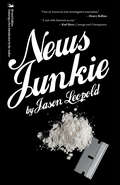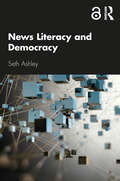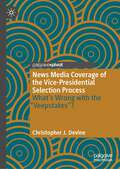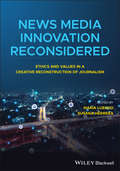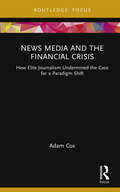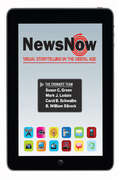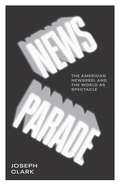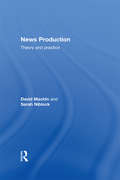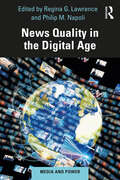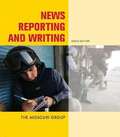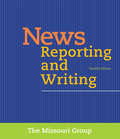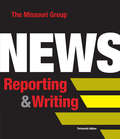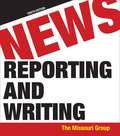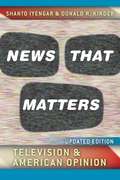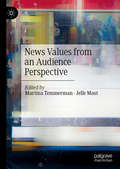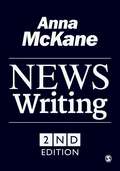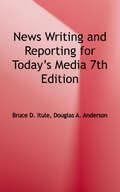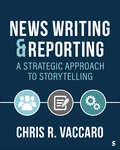- Table View
- List View
News As Discourse (Routledge Communication Series)
by Teun A. van DijkFirst Published in 1990. Routledge is an imprint of Taylor & Francis, an informa company.
News Division: When more became less: my experience in the 24-hour news world (News Memoir)
by Tim OrtmanWhat constitutes unbiased information vs. opinion disguised as facts? Why and how has what we watch become diluted, dramatized, and polarized? How have we arrived at this point? What was lost? What was gained? Through personal anecdotes, and a touch of humor, rooted in over 35 years of experience and laser-focused analysis, the author demonstrates how the television news landscape has changed and what this means for news gathering and reporting as well as for those watching at home. While the fringes on the left and the right expand, the unwavering center still delivers straightforward unbiased news, albeit packaged differently. The responsibility of discerning what we are taking in relies on us, the consumers: this book helps guide us to understand what we are being fed every day.
News Frames and National Security
by Douglas M. Mcleod Dhavan V. ShahDid media coverage contribute to Americans' tendency to favor national security over civil liberties following the 9/11 attacks? How did news framing of terrorist threats support the expanding surveillance state revealed by Edward Snowden? Douglas M. McLeod and Dhavan V. Shah explore the power of news coverage to render targeted groups suspicious and to spur support for government surveillance. They argue that the tendency of journalists to frame stories around individual targets of surveillance - personifying the domestic threat - shapes citizens' judgments about tolerance and participation, leading them to limit the civil liberties of a range of groups under scrutiny and to support "Big Brother".
News Journalism and Twitter: Disruption, Adaption and Normalisation (Disruptions)
by Chrysi DagoulaThis book provides a critical account of the impact of Twitter on journalism, exploring how the news media has adapted to and normalised the use of the platform in the industry. Offering a comprehensive understanding of Twitter uses for journalistic purposes, this book explores the platform’s use as a ‘global village’, as an ambient news environment, and as a global marketplace. Drawing on two empirical case studies (United Kingdom and Greece), Dagoula examines academic conceptualisations of Twitter, journalists’ self-perceptions, and uses of the platform by a variety of media outlets and journalists. Adopting an evolutionary approach known as punctuated equilibrium, which consists of three stages of disruption, adaption, and normalisation, the author reveals the costs and benefits of Twitter’s impact on both the institutional values and practices of news journalism today. News Journalism and Twitter is an invaluable resource for researchers and students of digital journalism and media studies.
News Junkie
by Jason LeopoldIn News Junkie, the cutthroat worlds of journalism, politics, and high finance are laid bare by Jason Leopold, whose addictive tendencies led him from a life of drug abuse and petty crime to become an award-winning investigative journalist who exposed some of the biggest corporate and political scandals in recent American history. Leopold broke key stories about the California energy crisis and Enron Corporation's infamous phony trading floor as a reporter for the Dow Jones Newswires. While he exposed high-rolling hucksters and double-dealing politicians, Leopold hid the secrets of his own felonious past, terrified that he would be discovered. When the news junkie closed in on his biggest story - one that implicated a Bush administration member - he found himself pilloried by angry colleagues and the president's press secretary, all attempting to destroy his career. Introducing an unforgettable array of characters - from weepy editors and love-starved politicos to steroid-pumped mobsters who intimidate the author into selling drugs and stolen goods - News Junkie shows how a man once fueled by raging fear and self-hatred transforms his life, regenerated by love, sobriety, and a new, harmonious career with the independent media.
News Literacy and Democracy
by Seth AshleyNews Literacy and Democracy invites readers to go beyond surface-level fact checking and to examine the structures, institutions, practices, and routines that comprise news media systems. This introductory text underscores the importance of news literacy to democratic life and advances an argument that critical contexts regarding news media structures and institutions should be central to news literacy education. Under the larger umbrella of media literacy, a critical approach to news literacy seeks to examine the mediated construction of the social world and the processes and influences that allow some news messages to spread while others get left out. Drawing on research from a range of disciplines, including media studies, political economy, and social psychology, this book aims to inform and empower the citizens who rely on news media so they may more fully participate in democratic and civic life. The book is an essential read for undergraduate students of journalism and news literacy and will be of interest to scholars teaching and studying media literacy, political economy, media sociology, and political psychology.
News Literacy and Democracy
by Seth AshleyNews Literacy and Democracy invites readers to go beyond surface-level fact checking and to examine the structures, institutions, practices, and routines that comprise news media systems.This introductory text underscores the importance of news literacy to democratic life and advances an argument that critical contexts regarding news media structures and institutions should be central to news literacy education. Under the larger umbrella of media literacy, a critical approach to news literacy seeks to examine the mediated construction of the social world and the processes and influences that allow some news messages to spread while others get left out. Drawing on research from a range of disciplines, including media studies, political economy, and social psychology, this book aims to inform and empower the citizens who rely on news media so they may more fully participate in democratic and civic life.The book is an essential read for undergraduate students of journalism and news literacy and will be of interest to scholars teaching and studying media literacy, political economy, media sociology, and political psychology.
News Media Coverage of the Vice-Presidential Selection Process: What's Wrong with the "Veepstakes"?
by Christopher J. DevineThis book provides the first systematic, empirical analysis of the media’s approach to US vice-presidential selection (or the “veepstakes”). In their news coverage, Devine finds that media outlets typically treat vice-presidential selection as little more than a game—by focusing on how potential running mates might help to win the election, rather than how they might help the next president to govern. Based on an original content analysis of hundreds of veepstakes profiles from 2000–2020, this book quantifies the news media’s relative emphasis on various selection criteria, in general and across different electoral circumstances. The analysis suggests that journalists generally fail to serve the public interest by emphasizing electoral over governing considerations. However, Devine also points to positive examples of media coverage that help the public to evaluate potential running mates’ governing credentials, and suggests ways in which scholars, journalists, and citizens might encourage media outlets to provide more substantive, responsible coverage of the vice-presidential selection process in future elections.
News Media Innovation Reconsidered: Ethics and Values in a Creative Reconstruction of Journalism
by María Luengo Susana Herrera-DamasA guide to journalistic ethics for today’s digital technologies With contributions from an international panel of experts on the topic, News Media Innovation Reconsidered offers a guide for the revitalizing of the ethical and civil ideals of journalism. The authors discuss how to energize journalistic practices and products and explore how to harness the power of digital technological innovations such as immersive journalism, the automatization and personalization of news, newsgames, and artificial-intelligence news production. The book presents an innovative framework of “creative reconstruction” and reviews new journalistic concepts, models, initiatives, and practices that clearly demonstrate professional ethics that embrace truth seeking, transparency, fact checking, and accuracy, and other ethical considerations. While the contributors represent numerous countries, many of examples are drawn from the Spanish-speaking media and can serve as models for an international audience. This important book: Explores the impact on the news media from mobile-first, virtual reality, and artificial intelligence-driven platforms Examines the challenges of maintaining journalistic ethics in today’s digital world Demonstrates how to use technology to expose readers to news outside their comfort zones Provides information for discerning truth from fake news Written for researchers, students in journalism and communication programs, New Media Innovation Reconsidered offers a much-needed guide for recreating journalistic ethics in our digital age.
News Media and the Financial Crisis: How Elite Journalism Undermined the Case for a Paradigm Shift (Routledge Focus on Communication and Society)
by Adam CoxThis book explores how leading news media responded to the 2008 financial crisis and its aftermath, showing how journalists regularly framed discussions about post-crisis regulatory reform in ways that reinforced the same market liberal policy paradigm that had ushered in the crisis. Drawing on an analysis of nearly three years of news coverage and on interviews with journalists who covered the financial crash for major media groups, Adam Cox demonstrates how this framing of issues, often focusing on the costs of tighter regulation rather than the preventive benefits, formed the basis of a post-crisis narrative in the United States that undermined the role of the state, despite the wreckage that had just occurred. He looks at how state actors, think tanks and the financial industry worked in concert to encourage such a narrative, ultimately lending support to a market liberal worldview that was being seriously challenged for the first time in decades. While highlighting journalists’ ability to resist agenda-building efforts by powerful actors, this book offers a methodology for considering media narratives based on quantitative analysis of framing patterns. News Media and the Financial Crisis is aimed at students and researchers working at the intersection of communications, journalism, political economy and public policy.
News Now: Visual Storytelling in the Digital Age (2-downloads)
by Susan Green B. William Silcock Carol Schwalbe Mark LodatoDebuting in its first edition News Now: Visual Storytelling in the Digital Age helps today's broadcast journalism students prepare for a mobile, interactive, and highly competitive workplace. The authors, all faculty members of the prestigious Cronkite School of Journalism and Mass Communication, bring their real-world expertise to a book designed to be a trusted reference for the next generation of broadcast journalists.
News Parade: The American Newsreel and the World as Spectacle
by Joseph ClarkA fascinating look at the United States&’ conflicted relationship with news and the media, through the lens of the newsreel When weekly newsreels launched in the early twentieth century, they offered the U.S. public the first weekly record of events that symbolized &“indisputable evidence&” of the news. In News Parade, Joseph Clark examines the history of the newsreel and how it changed the way Americans saw the world. He combines an examination of the newsreel&’s methods of production, distribution, and reception with an analysis of its representational strategies to understand the newsreel&’s place in the history of twentieth-century American culture and film history.Clark focuses on the sound newsreel of the 1930s and 1940s, arguing that it represents a crucial moment in the development of a spectacular society where media representations of reality became more fully integrated into commodity culture. Using several case studies, including the newsreel&’s coverage of Charles Lindbergh&’s transatlantic flight and the Sino–Japanese War, News Parade shows how news film transformed the relationship between its audience and current events, as well as the social and political consequences of these changes. It pays particular attention to how discourses of race and gender worked together with the rhetoric of speed, mobility, and authority to establish the power and privilege of newsreel spectatorship.In the age of fake news and the profound changes to journalism brought on by the internet, News Parade demonstrates how new technologies and media reshaped the American public&’s relationship with the news in the 1930s—a history that can help us to better understand the transformations happening today.
News Production: Theory and Practice
by David Machin Sarah NiblockBringing to the forefront a much-needed book that bridges the gap between journalistic theory and practice, Sarah Niblock and David Machin provide here an invaluable real-life account of reporting in the context of contemporary newsrooms. Providing eight detailed ethnographies of eight different news production settings, News Production includes individual chapters that follow two news workers through their daily routines, detailing the exact nature of their jobs. It provides students with: case studies to compare to their own experiences concrete examples to consolidate their skill-based training questions to raise about their placements information on how to prepare reports constraints they may encounter, and how to deal with them. With chapters including ‘News Agencies’, ‘The Roving Reporter’, ‘Photojournalism’ and ‘The New Reporter Learning the Ropes’, for anyone taking practical units in news reporting, sub-editing, and law and ethics, News Production will provide them with all the information they need to succeed in this hectic, competitive and exciting world.
News Quality in the Digital Age (Media and Power)
by Regina G. Lawrence Philip M. NapoliThis book brings together a diverse, international array of contributors to explore the topics of news “quality” in the online age and the relationships between news organizations and enormously influential digital platforms such as Facebook, Google, and Twitter. Covering topics ranging from internet incivility, crowdsourcing, and YouTube politics to regulations, algorithms, and AI, this book draws the key distinction between the news that facilitates democracy and news that undermines it. For students and scholars as well as journalists, policymakers, and media commentators, this important work engages a wide range of methodological and theoretical perspectives to define the key concept of “quality” in the news media.
News Reporting And Writing
by Brian S. Brooks George Kennedy Daryl R. Moen Don RanlyThe Missouri Group's clear and authoritative step-by-step approach comes from years in the field and in the classroom. Through extensive contemporary examples and dependable, no-frills advice, the Missouri Group teaches students the reporting and writing skills they need to become effective journalists in every medium and for every beat. The ninth edition of News Reporting and Writing addresses students' greatest challenges by providing more writing help than ever before. It prepares students for the realities of today's news rooms with the most contemporary coverage of new trends in journalism including convergence, citizen journalism, and researching online. A reinvigorated new text design emphasizes what's important, increases ease of navigation, and makes salient features and examples quicker and easier to find.
News Reporting and Writing
by Brian S. Brooks George Kennedy Daryl R. Moen Don RanlyNews Reporting and Writing teaches print and digital media reporting and writing. This edition expands further into the digital realm while continuing to stress the essential reporting and writing skills that are the foundation for the profession - past, present, and future, no matter the medium. Now available with LaunchPad Solo for Journalism, a digital platform that combines the News Reporting and Writing workbook, videos, thousands of grammar exercises, and video tools in one-easy-to-use space.
News Reporting and Writing
by The Missouri GroupNews Reporting & Writing teaches the essential reporting and writing skills within the context of today’s digital media landscape. The Missouri Group, including new author, Beverly Horvit, have extensively revised this edition with diverse examples and a focus on the role of technology to give students a strong foundation in the craft and raise awareness of current issues like fake news and censorship. The team focuses on developing the skills journalists actually use and the many careers in which they, and students, could use them—from working in news, to advertising, to public relations. Much of the text has been rewritten and reorganized to introduce a stronger flow of content paired with the most current coverage of today’s news industry. Available with LaunchPad Solo for Journalism, the perfect tool set for budding media writers. This online resource includes access to News Reporting & Writing’s digital workbook and Exercise Central for AP Style, a resource containing thousands of activities focused on overcoming the most common grammar and style issues journalism students make.
News Reporting and Writing (10th Edition)
by Brian S. Brooks George Kennedy Daryl R. Moen Don RanlyIt's a tumultuous time in journalism as media forms evolve and new models emerge. There are few clear answers, but no one is more prepared than The Missouri Group to tackle these issues head on and to teach students the core, enduring journalism skills they need to succeed -- whether they write for the local paper, a professional blog, cable news, or even work in public relations.
News Talk
by Colleen CotterWritten by a former news reporter and editor, News Talk gives us an insider's view of the media, showing how journalists select and construct their news stories. Colleen Cotter goes behind the scenes, revealing how language is chosen and shaped by news staff into the stories we read and hear. Tracing news stories from start to finish, she shows how the actions of journalists and editors - and the limitations of news writing formulas - may distort a story that was prepared with the most determined effort to be fair and accurate. Using insights from both linguistics and journalism, News Talk is a remarkable picture of a hidden world and its working practices on both sides of the Atlantic. It will interest those involved in language study, media and communication studies and those who want to understand how media shape our language and our view of the world.
News That Matters: Television & American Opinion (Chicago Studies In American Politics Ser.)
by Shanto Iyengar Donald R. KinderAlmost twenty-five years ago, Shanto Iyengar and Donald R. Kinder first documented a series of sophisticated and innovative experiments that unobtrusively altered the order and emphasis of news stories in selected television broadcasts. Their resulting book News That Matters, now hailed as a classic by scholars of political science and public opinion alike, is here updated for the twenty-first century, with a new preface and epilogue by the authors. Backed by careful analysis of public opinion surveys, the authors show how, despite changing American politics, those issues that receive extended coverage in the national news become more important to viewers, while those that are ignored lose credibility. Moreover, those issues that are prominent in the news stream continue to loom more heavily as criteria for evaluating the president and for choosing between political candidates.“News That Matters does matter, because it demonstrates conclusively that television newscasts powerfully affect opinion. . . . All that follows, whether it supports, modifies, or challenges their conclusions, will have to begin here.”—The Public Interest
News Values
by Paul Brighton Dennis FoyWritten by two practitioner-academics (who between them have more than fifty years of news industry experience), News Values analyses the shape of the news industry - a world of rolling news and multimedia platforms, and a world where broadcast news is increasingly considered another element of show business. Detailed chapters include critiques of existing theories, close study of the newspaper, radio, television and internet news channels, plus informative chapters on the many factors that shape the news we read, watch and hear including the role of the citizen journalist, user-generated content, spin doctors, and the new wave of press barons. Further chapters provide detailed analysis of the way in which the same story is treated across different media channels, and how journalists and editors work to keep breathing new life into rolling news stories.
News Values from an Audience Perspective
by Martina Temmerman Jelle MastThis book focuses on journalistic news values from an audience perspective. The audience influences what is deemed newsworthy by journalists, not only because journalists tell their stories with a specific audience in mind, but increasingly because the interaction of the audience with the news can be measured extensively in digital journalism and because members of the audience have a say in which stories will be told. The first section considers how thinking about news values has evolved over the last fifty years and puts news values in a broader perspective by looking at news consumers’ preferences in different countries worldwide. The second section analyses audience response, explaining how audience appreciation and ‘clicking’ behaviour informs headline choices and is measured by algorithms. Section three explores how audiences contribute to the creation of news content and discusses mainstream media’s practice of recycling audience contributions on their own social media channels.
News Writing (Second Edition)
by Anna Mckane"Deserves to be on every journalism student's reading list and every tutor's book shelf. It is clear, straightforward and scholarly in a very accessible way... bursting with good advice and insight which should benefit all who all read it." - Kate Jenner, School of Journalism and Digital Communication, University of Central Lancashire "A first-class no-nonsense guide to news writing... Anna McKane's wealth of experience both as a journalist and a lecturer in journalism gives News Writing the edge over similar tomes." - Kate Shanahan, Lecturer in Journalism, School of Media, Dublin Institute of Technology The ability to hone and craft an eye-catching news story is fundamental to good journalism. It is an essential skill that the young journalist of today must carry with them. The growth of online journalism and the use of social media has meant that the skills required in news writing are evolving, opening up fresh challenges and exciting new possibilities. Anna McKane's News Writing takes you step-by-step through the key aspects of writing news on both print and online platforms, equipping you with all that you need to become an articulate, accurate and engaging journalist. Crucially, the book will show you how to: * create an attention-grabbing intro or first paragraph * structure the content of your story effectively * use the appropriate language. Fully updated to account for the role of online journalism, this second edition guides you through the essentials of website presentation, from headlines and standfirsts to the use of smartphone images and links. An all-new chapter shows you how to use Twitter and online blogs to piece together a winning story, and up-to-date examples and exercises throughout encourage you to pick apart and analyse the techniques used in a variety of recent news stories across a range of platforms. This is the essential workbook to take you through your studies in Journalism and News Writing.
News Writing and Reporting for Today's Media
by Douglas A. Anderson Bruce D. ItuleNews Writing and Reporting takes students on the beat, into the press box, council chambers, and courthouse, and to a speech and press conference. It introduces them to current issues such as cultural sensitivity, multimedia journalism, and legal and ethical considerations that journalists face every day. Throughout the text, reporters and editors offer their down-to-earth advice, and, whenever possible, professional journalists covering actual stories are used as instructional models. Students are exposed to the work of professionals while gathering the tools to follow in their footsteps.
News Writing and Reporting: A Strategic Approach to Storytelling
by Chris R. VaccaroWith a focus on how the modern newsroom runs and operates, News Writing and Reporting: A Strategic Approach to Storytelling prepares students to become successful journalists in today′s competitive news industry. Author Chris Vaccaro applies an audience-centered and business-minded approach, discusses emerging media trends, and guides students through strategic thought in multiplatform reporting and storytelling. The book offers practical career tips, interviews with reporters, and full career and product development guides, while each chapter concludes with strategies and writing exercises to equip students with tactics for planning, structuring, and editing content across various platforms.
